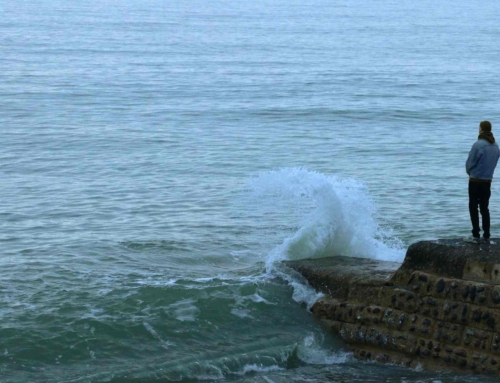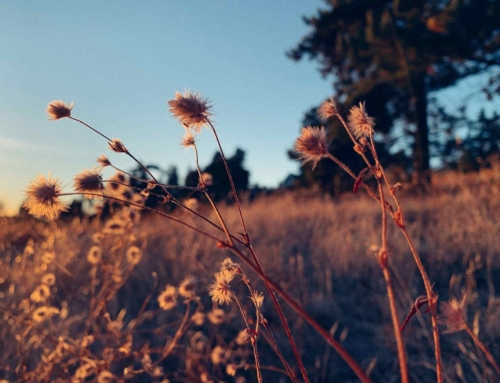If you are searching for natural remedies for anxiety, you have come to the right place.
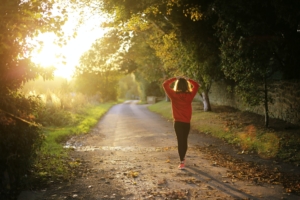 Anxiety is a common response to stress or danger. Almost everyone experiences it at one time or another. However, when it becomes excessive or disproportionate to the circumstances, it can harm your physical and mental well-being, sap your energy, and turn into an anxiety disorder that interferes with your ability to cope with day-to-day life.
Anxiety is a common response to stress or danger. Almost everyone experiences it at one time or another. However, when it becomes excessive or disproportionate to the circumstances, it can harm your physical and mental well-being, sap your energy, and turn into an anxiety disorder that interferes with your ability to cope with day-to-day life.
Different people experience anxiety in different ways. Symptoms can range anywhere from butterflies in your stomach before giving a speech, to constant dread about the future that turns into a full-blown panic attack.
The following are 19 evidence-based natural remedies for anxiety that have the potential to provide you with symptom relief. They can be used alone or in combination with therapy and/or medication.
Physical activity.
Regular exercise is the number one lifestyle change recommended for people with anxiety. Studies indicate that aerobic activity increases your heart rate, decreases your blood pressure, and releases the chemical compound endorphin into your system, which has a calming effect on your body and can significantly reduce anxiety.
Progressive muscle relaxation.
Progressive muscle relaxation helps relieve anxiety by physically relaxing your body. It involves systematically tensing and releasing different muscle groups, one by one, and focusing on the sense of relaxation. You can do it seated or lying down. Here is the process:
- Start by taking a few deep breaths to relax your body.
- Tense the first muscle group and hold for 10 seconds. Notice how it feels when your muscles are tense.
- Let go and completely relax the muscle group.
- Relax for 10 to 20 seconds before tensing the next muscle group. Notice how different your muscles feel when they are relaxed.
- Move progressively up or down your body in a specific sequence, such as toes, calves, thighs, hands, arms, buttocks, abdominal muscles, chest, shoulders, lips, eyes, eyebrows, and forehead.
Grounding techniques.
Anxious thoughts focus on the future. Grounding techniques such as the 5-4-3-2-1 method help reduce anxiety by bringing you back to the present moment.
- Look around you and name five things you can see.
- Look for four things you can hear.
- Look for three things you can feel.
- Look for two things you can smell.
- Look for one thing you can taste.
Deep breathing.
Anxiety tends to cause shallow, rapid breathing that makes your symptoms worse. Deep diaphragmatic breathing, on the other hand, encourages an optimal exchange of oxygen and carbon dioxide, slows your heart rate, lowers blood pressure, and has a calming effect on your nervous system that causes anxiety levels to drop.
One of the most popular breathing techniques is called box breathing, where you slowly breathe in for a count of 4, hold it for a count of 4, breathe out for a count of 4, hold it for a count of 4, and repeat.
Journaling.
Journaling about your anxiety is a healthy way of venting and processing your feelings that can give you better clarity and make it feel more manageable.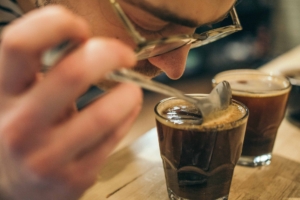
When you are feeling anxious, your mind may have a hard time processing events and emotions in a healthy, coherent manner, but writing them down can help you look at them more rationally and determine whether what you are feeling is factual or not. It can also help you identify triggers and maladaptive patterns of thought and/or behaviors that could be contributing to anxiety.
Relaxing activities.
Take your mind off your anxious thoughts by doing something relaxing you enjoy, whether that be gardening, listening to music, reading a good book, or going for a walk.
Laughter.
Laughing increases feelings of well-being by expanding and contracting muscles that decrease tension and anxiety, reducing the stress hormone cortisol, and producing feel-good brain chemicals called endorphins.
Look for things to make you laugh, such as thinking about something funny, talking to a funny friend, watching a funny movie or comedy show, or listening to a humorous podcast.
Daily time outdoors. Spending time in nature and walking in a green environment have been clinically proven to reduce feelings of stress and anxiety. In addition, sunlight is a natural source of vitamin D, which has also been linked with lowered symptoms of anxiety.
Meditation.
Meditation has been used for centuries as a natural way to deal with anxiety. Taking time to let your mind be still and connect to God through prayer and meditation on the Bible can help you become emotionally grounded and decrease your anxious thoughts.
Warm baths.
Warm water is very relaxing and can help calm an anxious mind. Try adding a half cup of Epsom salt or a few drops of essential oils to the water. Epsom salts contain magnesium, which is thought to have anxiety-fighting properties as well.
Time management strategies.
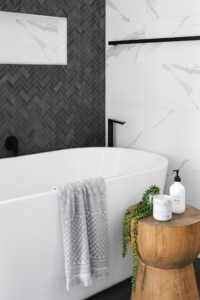 Cut back on stress by learning how to organize and prioritize your day. A chaotic schedule can cause anxiety, whereas having a routine and a planned agenda is a good way to reduce it. Avoid multitasking and break major projects down into smaller chunks to make them more manageable. Time management tools such as planners and calendars can help you avoid over-scheduling or setting unachievable targets.
Cut back on stress by learning how to organize and prioritize your day. A chaotic schedule can cause anxiety, whereas having a routine and a planned agenda is a good way to reduce it. Avoid multitasking and break major projects down into smaller chunks to make them more manageable. Time management tools such as planners and calendars can help you avoid over-scheduling or setting unachievable targets.
Aromatherapy.
Aromatherapy is a holistic approach to the treatment of anxiety that dates to the 5th century BC when the physician, Hippocrates, advocated using pleasant scents for healing.
Studies have confirmed that breathing in aromas with soothing qualities such as lavender, bergamot, or Roman chamomile, can have a calming effect on the nervous system that helps reduce anxiety.
Herbal teas.
Sipping on a warm cup of herbal tea such as chamomile or green tea can have a relaxing effect. Both contain the antioxidant, apigenin, which is thought to have muscle-relaxing properties.
Chamomile is widely recognized for its effectiveness in calming nerves and inducing sleep and has been used throughout the years as a classic remedy for anxiety.
A well-balanced diet.
Eating a well-balanced, anti-inflammatory diet that contains important nutrients like omega-3s, vitamin B, and magnesium-rich foods, and staying well-hydrated, can help alleviate symptoms of anxiety. Include foods such as fruits, vegetables, whole grains, lean protein, fatty fish, nuts, and seeds, and avoid sugary or processed foods, which have been found to contribute to anxiety and make its symptoms harder to manage.
Limited alcohol and caffeine.
Caffeine is a stimulant that can at first give you a boost of energy and increase alertness. However, it also increases the level of the stress hormone cortisol in your system, which can mimic the symptoms of anxiety and make you feel anxious and jittery. Similarly, alcohol may make you feel better in the moment, but it drains your system of B vitamins and exacerbates your symptoms of anxiety over time.
No smoking.
At first, smoking may appear to reduce stress and anxiety, but it can do just the opposite. Nicotine impairs natural brain activity, which can lead to a higher likelihood of anxiety over time. Quitting smoking enables the natural processes in the brain to resume and helps reduce anxiety once the nicotine is out of your system.
Massage.
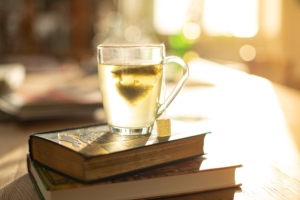 Getting a massage is one of the most popular natural remedies for anxiety. It has a calming, relaxing effect that can help relieve your anxious symptoms. If you can’t get a body massage, try slowly stroking your face, using your fingertips to make long lines along your forehead and down your cheeks, and massaging your temples. This can also help release tension and have a soothing effect.
Getting a massage is one of the most popular natural remedies for anxiety. It has a calming, relaxing effect that can help relieve your anxious symptoms. If you can’t get a body massage, try slowly stroking your face, using your fingertips to make long lines along your forehead and down your cheeks, and massaging your temples. This can also help release tension and have a soothing effect.
Pets.
Studies have shown that spending time with animals and caring for them or petting them can reduce stress and anxiety.
Weighted blankets.
Weighted blankets provide even pressure over your whole body, which slows down your autonomic nervous system and helps you relax. The sensation of sleeping under one is like receiving a big bear hug. Studies have shown that this comforting feeling helps relieve anxiety and promote sleep.
If you have questions and/or need more help than what this article could provide, please give us a call today.
References:
Annette McDermott. “10 Ways to Naturally Reduce Anxiety.” Healthline. Updated February 28, 2023. healthline.com/health/natural-ways-to-reduce-anxiety.
Joshua Cox-Steib. “9 Natural Ways to Relieve Anxiety Without Medication.” CNET. November 9, 2022. cnet.com/health/mental/9-tip-to-relieve-anxiety-without-medication-that-actually-work/
“Walking Down the Road”, Courtesy of Emma Simpson, Unsplash.com, CC0 License; “Coffee”, Courtesy of Battlecreek Coffee Roasters, Unsplash.com, CC0 License; “Bath”, Courtesy of R ARCHITECTURE, Unsplash.com, CC0 License; “Tea and Books”, Courtesy of Elena Kloppenburg, Unsplash.com, CC0 License






